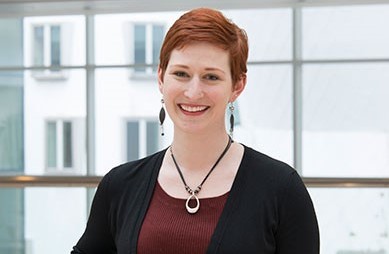
Doctor Rachel Romeo is a developmental cognitive neuroscience and licensed speech-language pathologist. She is broadly interested in how one’s early childhood experiences contribute to their neural and cognitive development, and her recent work aims to better understand the causes and consequences of “achievement gaps” between children of higher and lower socioeconomic status (SES).
She aims to determine what social and experiential factors give rise to these disparities, as well as the neural mechanisms by which a child’s early environment becomes biologically embedded in the brain. Rachel employs multi-modal behavioral and neuroimaging techniques, drawing from interdisciplinary fields of developmental psychology, cognitive neuroscience, psycholinguistics, education, and speech and hearing/communication sciences. Ultimately, she aims to translate her research to better inform speech language therapy and educational practices, in an effort to improve developmental outcomes for children of all backgrounds.
When did you first become interested in neural and cognitive development?
I took my first psychology course in high school and was immediately fascinated by the way the brain gives rise to everything meaningful about our personality, thought, and actions. I became particularly interested in language during a chance course as an undergrad, in which I realized how humans are so inherently communicative – it is essential to our evolution as a species, and there can be dire consequences when communication breaks down. I knew I wanted to better understand the neural development that allows babies to be little language-learning machines and help children who struggle with language, which led to my joint research and clinical career.
Is there an easy way for parents to help their child’s cognitive development?
In my research I’ve found that there is a direct relation between the amount of adult-child conversational turn-taking that children experience and their language and brain development. This means anytime a child vocalizes and an adult responds, or vice versa. So we recommend that all parents (and any caregivers!) can facilitate brain development simply by talking with their children! And it doesn’t have to be complex – with infants it might be something very simple like taking turns making silly noises, and with older children it can be asking questions and reading books together. These are simple but effective ways of boosting their cognitive development.
How does your research help better inform educational practices?
Much of my work focuses on trying to better understand the socioeconomic achievement gap and leverage the power of cognitive neuroscience to help close these gaps. One of the things we’ve found is that the brain responds differently to reading instruction depending on the environment in which you grew up. We’re currently trying to understand whether we can use neuroimaging to predict which type of instruction a child might be most responsive to, which could help close gaps through personalized learning.
What is your favorite thing about working at MIT?
This is one of the most collaborative places I have ever worked! It’s not unusual to find a highly interdisciplinary group of people uniting their unique, disparate perspectives to solve a difficult problem. I believe that this type of collaborative, intersectional work is how we make some of the most fascinating discoveries and innovations.